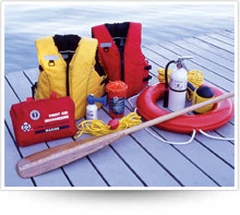Call: 1-800-832-7191
Can Safety be taken Overboard?

SAFETY OVERVIEW
I’m often asked can safety be taken overboard. Not always in those exact terms but you get the point. I was in the Occupational Safety field for almost two decades. Please give me a chance at answering this one in a somewhat brief manner. Believe me when I say, I can go on forever about Safety!
Let me start by saying there are no shortcuts when it comes to safety, patience and consistency lead to safe results.
In the safety world there are always three factors at play: Rules, Equipment, and Training. The best kept secret in the safety world is that the absolute most paramount factor is mindset. If you don’t prepare an individual’s mindset now, you’ll be preparing the incident paperwork later. Unfortunately “later” may include your family or friends out on a boat. So applying rules and enforcing them may be your answer. Maybe you don’t have or may need the proper equipment. It might simply be you need to offer the site specific training for everyone. Just about every safety case can be handled by the big three.
When asked, the overwhelming majority of people would rather be “safe than sorry” so for me, the short answer to the title question is “No, you can’t be too safe”. On the other hand, you can create an unsafe situation by applying too many safeguards to any one circumstance. Any administrator or supervisor must be able to recognize this.
SAFETY ON THE BOAT
There is no need to have 20 PFD’s on board a vessel that has a capacity of 6 passengers. As you can envision, the boat would be overflowing with life jackets which could produce a dangerous situation and the storage area used may best be utilized for other equipment such as bailing devices, extra signaling equipment, fuel, rain gear for example. In this scenario, you can still keep people safe with less PDF’s and increase their safety by carrying the other pieces of equipment. The trick is to find that balance.
Certainly it makes good sense to make sure all your boating equipment is in good working order. Most of the time it only takes a few minutes. You must inspect all of the gear you are required to have on board with you. It also makes good sense to keep extra safety gear on board. Where are you going to be on the water. Flirting with the open Atlantic any time soon. If so, beef up on visual distress. Invest in a better VHF radio. Have a better throwable on board. Just meeting the minimal requirements speaks volumes to me about ones attitude towards safety.
Due Diligence pla;ys a huge role. Review, assess, review again, and assess again. Chances are you’ll come to the right conclusions.
FINAL THOUGHTS
Connecticut Boating Certificates (CBC) emphasizes safety in our classrooms because it directly relates to saving lives. Way too many injuries and deaths occur each year that could have been 100% avoided with both the know-how and the right safety gear. I hope this was helpful and always remember to step back and ask yourself, “is this really safe?”
Above all, be smart, be safe, and remember there are no egos when passengers’ lives are in your hands.
Please visit our Public Course Schedule to view all of the classes we have available for you. Zoom Classes are available now. There has never been an easier way to get your Boating Certificate
Here is a great article from Dirty Jobs Mike Rowe: Walk me through this “Safety Third” thing – Mike Rowe
